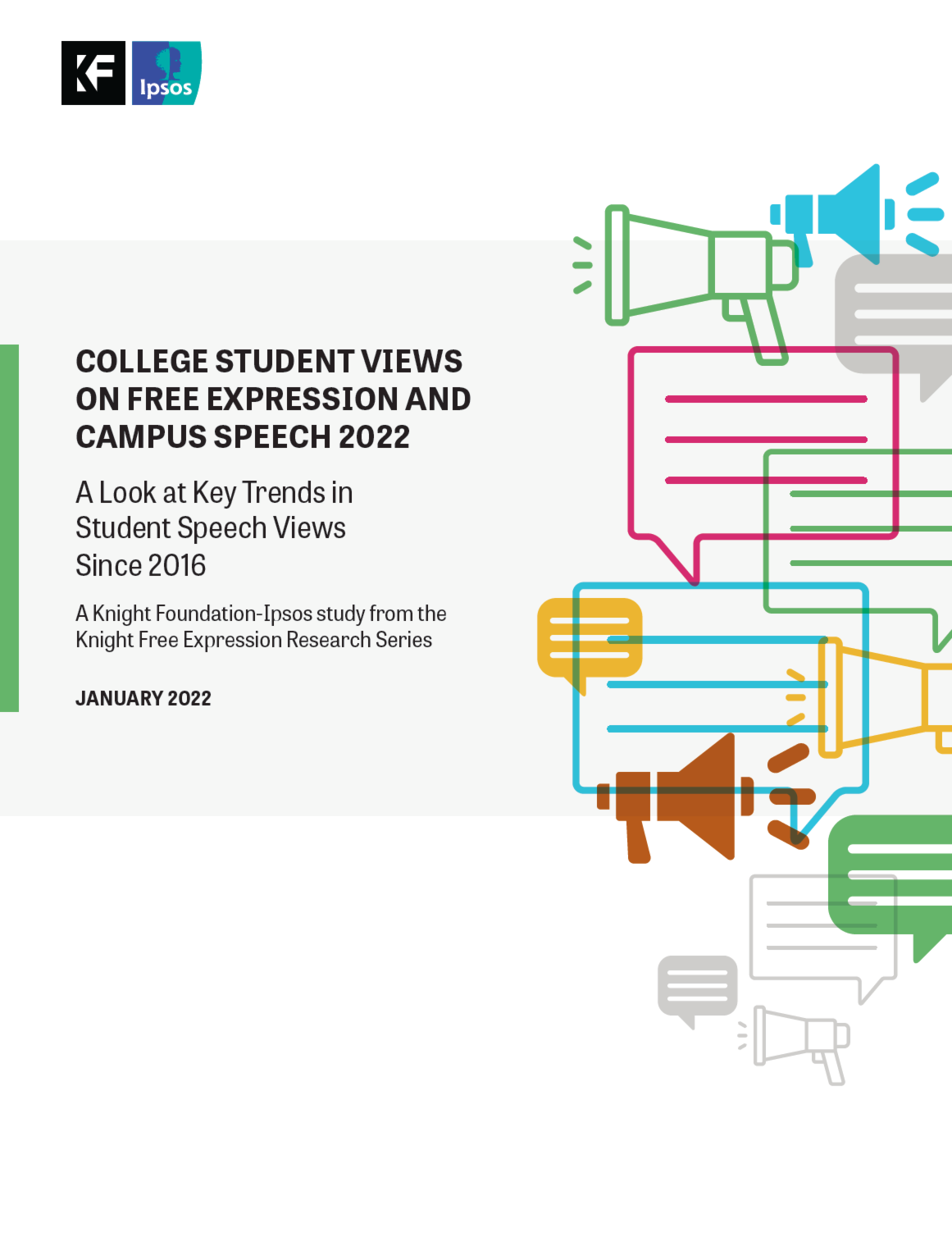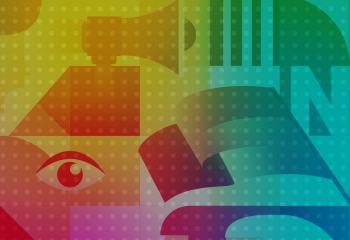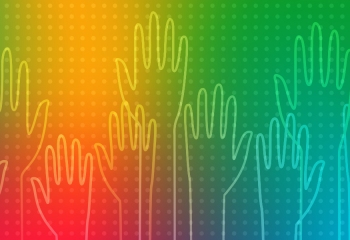A Look at Key Trends in Student Speech Views Since 2016
OVERVIEW
College campuses have long been places where the limits of free expression are debated and tested. In recent years, this dialogue has grown more fraught as some schools have sought to create a more protective speech environment for students. Moreover, key events shaping the past two years, such as the COVID-19 pandemic, the racial justice movement and the 2020 election, have only added deeper dimensions to the dialogue around free speech playing out on campus and in society at large.
The “Knight-Ipsos College Student Views on Free Expression and Campus Speech” report is the fourth in a series of Knight Foundation reports measuring college student attitudes toward speech and the First Amendment since 2016. For this report, Knight Foundation commissioned Ipsos to conduct a survey with a nationally representative sample of over 1,000 college students ages 18-24 enrolled in all types of higher education institutions, along with 4,000 American adults, offering insight into how college students’ views on free speech compare with those of the general public. In addition to the past Knight-Gallup campus speech surveys (2016, 2017, 2019), Knight has studied free speech views among high school students since 2004. Trends in college student attitudes are included throughout this report.
For findings on how the adult population views free speech and expression, please see “Free Expression in America Post-2020,” published earlier in January 2022.
This Knight Foundation-Ipsos report offers nuanced insight into how college students perceive campus speech and First Amendment protections today, including how views are evolving within different factions of the student body. This survey reinforces that students are not a monolithic group when it comes to speech, finding that partisanship, race, and ethnicity drive meaningful differences in how college students view speech. Understanding where different groups stand is vitally important for higher education leaders as they seek to foster free expression on college campuses and create a campus environment that is diverse, equitable, and inclusive.
The findings described in this report cover many, but not all, of the rich insights possible from this complex dataset. We invite the public and researchers to explore this publicly available resource in further detail.
EXECUTIVE SUMMARY
- Students view speech rights as important, yet less secure than in years past: Students continue to believe First Amendment rights and concepts of free speech are important to democracy. However, the percentage of students saying speech rights are secure has fallen every year since this question was first asked in 2016. This includes a 12-point decrease from 2019 as an increasing number of students—particularly Republicans—say they believe speech rights are threatened.
- Students of color believe their speech is less protected: While a majority of college students express confidence that the First Amendment protects “people like them,” Black students in particular feel much less protected, with a sharp decline from 2019 to 2021.
- Students believe exposure to a wide spectrum of speech at college is important: Most students continue to say colleges should allow students to be exposed to all types of speech, including political speech that is offensive or biased, rather than prohibiting speech they may find offensive.
- Students favor college policies that limit racist speech, but support for other speech interventions remains low: Most students favor colleges instituting policies that restrict the use of racial slurs on campus, suggesting that, for them, this particular category of speech does not merit mandated exposure on campus. Just 1 in 4 students favor schools disinviting controversial speakers, down from more than 2 in 5 in 2019. Similarly, the number of students who support colleges providing safe spaces or speech codes has fallen over the past two years.
- Students say the campus climate stifles free expression, yet speech on campus is making nearly 1 in 5 feel unsafe: More students now say the climate at school prevents some from saying things others might find offensive, and fewer feel comfortable disagreeing in class. Yet slightly more now report feeling unsafe because of comments made on campus than in 2019. This is particularly true for female students and students of color.
KEY CHARTS
A selection of key trends among students over the years. Full findings are in the body of the report.
KEY POPULATIONS
Experience with and attitudes toward speech vary widely among different student groups. The greatest differences exist among race and partisanship, and less so by gender or other demographic groupings. The following is a brief summary of the major findings and how opinion has changed over time, including the degree to which students have a formed opinion at all.
Democratic students
A majority of Democratic students believe that freedom of speech is secure in America today, a view that has held constant since 2019. When it comes to free expression broadly on campus, just over half of Democratic students favor schools fostering an environment in which all forms of speech are allowed, a view that’s softened since the last time Knight asked these questions two years ago.
Democrats are most likely to favor colleges implementing restrictions on certain forms of speech on campus, particularly around speech that is offensive to minority groups, something that was also true in prior Knight-Gallup research. Both now and in 2019, a large majority of Democratic students believe that colleges should be able to restrict the use of racial slurs on campus. When it comes to other speech policies, 3 in 4 support the creation of safe spaces on campus, close to half support the creation of speech codes that could limit offensive or biased speech, and 2 in 5 favor schools disinviting potentially controversial speakers. These views are consistent with previous surveys.
A majority of Democrats feel that their campus climate prevents people from saying what they believe for fear of offending others, although they are less likely to feel this way than Republicans and independents. Compared with two years ago, Democratic students now feel less comfortable voicing disagreements in class.
Independent students
Independent students express growing concerns about the fundamental security of free speech in America today while indicating their wariness of colleges limiting speech on campus. Just under half of all independents feel that free speech is secure today, down from 3 in 4 who felt this way in 2016. At the same time, a strong majority (8 in 10) believe that they are protected under the First Amendment. This puts them on about equal footing with Democrats, but slightly behind Republicans.
A majority believe that colleges should allow students to be exposed to all forms of speech. Opinion is split among the remaining minority with equal numbers (around 1 in 5 each) either believing that colleges should foster a protective environment or having no opinion on the matter. Much like two years ago, few support colleges disinviting controversial speakers or instituting speech codes.
A majority feel that their campus climate limits free expression, a view that has remained the same since 2019.
Independents were more likely than other groups of students to respond with the newly prompted “No opinion” option this year, indicating that many of them do not have strong views on these issues at all.
Republican students
Republican students are increasingly likely to feel that freedom of speech is under threat—just over a quarter believe it is secure today, down from two-thirds in 2016. More now also believe that their school’s climate stifles free expression.
A strong majority (7 in 10, down from 90% in 2019) say it is more important for colleges to allow students to be exposed to all types of speech, even if they find it offensive or biased, than to prohibit offensive or biased speech. A majority (56%)—albeit a smaller share than either Democratic or independent students—believe that colleges should be allowed to prohibit the use of racial slurs on campus. Moreover, for Republican students, this represents a more than 20-point drop from 2019 in the percentage who feel that colleges should restrict the use of racial slurs on campus.
Republicans are more divided around whether safe spaces should be allowed on campus—half favor this—but come down firmly against schools disinviting controversial speakers, something that was also true two years ago. A slim majority oppose schools instituting speech codes that could restrict offensive or biased speech. Unlike their Democratic counterparts, there has been no change over time in their already low level of comfort voicing disagreements with professors or other students; less than half remain comfortable.
White students
White students tend to favor allowing all types of speech on campus, over protecting students by prohibiting certain speech. They are least likely to report having felt unsafe or uncomfortable on campus because of comments about their identity, as compared with Black and Hispanic students. This has not changed substantially since 2019.
Overall, half of white college students believe that freedom of speech is under threat in America today. Yet a large majority feel that the First Amendment protects them, a view that has held steady since 2019.
When it comes to free expression on college campuses, white students are more likely than their Black or Hispanic counterparts to agree that schools should favor exposing students to all forms of speech, rather than protecting them from speech they may find offensive or biased. This was also true two years ago. They are slightly more likely than Black or Hispanic students to believe that the campus environment stifles free expression.
Black students
Fewer Black students express confidence that the First Amendment protects people like them. At the same time, a growing number of Black students favor a more protective campus environment.
The share of Black students who feel the First Amendment protects them a great deal has fallen by 20 percentage points over the past two years. Black students also express less confidence than the broader Black adult population about how effectively the First Amendment protects either them or the average American.
When it comes to campus free speech, the number of Black students who favor a campus environment that protects students by prohibiting speech that they might find offensive or biased has grown from 28% in 2019 to 36% in 2021. Both in 2019 and 2021, a majority of Black students feel that colleges should restrict the use of offensive racial slurs on campus.
Black students are more likely than white or Hispanic students to say that they have been made to feel uncomfortable due to statements that others have made in their presence about their identity or political beliefs, both in daily life and on campus. This has remained constant since 2019.
Hispanic students
Hispanic students’ views of campus speech, and personal experiences, fall somewhere between the differing views of Black and white students.
A strong majority of Hispanic students believe that the First Amendment protects people like them, something that was also true two years ago. The number of Hispanic students saying this is nearly equal to the number of white students. Similarly, Hispanic students align closely with white students on perceptions that free speech is under threat; half agree.
However, with regard to colleges restricting offensive racial slurs, Hispanic students fall closer to Black students, with 7 in 10 supporting such an action.
Hispanic students (along with independents) are among the most likely to say they have no opinion about whether colleges should foster a more protective speech environment or allow all types of speech on campus. A plurality oppose disinviting controversial speakers, but they are split around instituting speech codes. Like white students, close to 6 in 10 favor the creation of safe spaces on campus, less than the share of Black students who do.
Male and female students
For the most part, male and female students are aligned in their attitudes and experiences of free speech, with a few key differences. Overall, a majority of both male and female students say that free speech rights are important to American democracy, although fewer feel this way than in 2019. Now, female students are more likely than male students to say that free speech rights are extremely important, a change from 2019 when more men said free speech rights were extremely important.
Nearly 1 in 5 male and female students alike report having felt unsafe due to comments on campus, whereas larger gender differences were observed in prior years. A more meaningful difference appears when male and female students are asked if they have felt uncomfortable on campus. Female students remain significantly more likely to have felt uncomfortable due to speech on campus, as they did in 2019.
Download full report:
Related Resources
Free Expression in America Post-2020
A Knight-Ipsos study from the Knight Free Expression Research Series A Landmark Survey of Americans’ Views on Speech Rights
Post-2020, college students see speech as less secure, and students of color feel less protected
An uproar over a climate scientist’s canceled lecture at MIT. A furor over a Charles Murray talk at Middlebury College. An ongoing controversy concerning racist remarks by a University of Pennsylvania law professor. In recent years, headline-grabbing events like these have sparked an energetic debate about how higher education should treat speech in the 21st […]
Knight-Ipsos poll: College students covet free speech rights, but view them as increasingly fragile
A new study from the Knight Free Expression (KFX) Research Series shows that most college students in America strongly value free speech […]





